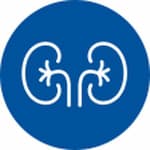With five fellowship positions annually, Duke University’s Nephrology program offers you one of the most highly sought-after career opportunities in medicine. Expect to accomplish great things here in a truly fellow-driven learning environment among a diverse group of faculty and trainees.

Our nephrology fellowship is led by Dr. Matthew A. Sparks, an internationally recognized educator known for his innovative teaching and commitment to advancing nephrology training. He is supported by Dr. Harpreet Singh and Dr. Rasha Raslan, who serve as Associate Program Directors. Both are integral to the daily educational experience of our fellows and are deeply invested in their growth and success.
Our leadership team is dedicated to fostering a supportive and nurturing environment where fellows can thrive both personally and professionally. The fellowship is designed to help you achieve your individual goals through personalized mentorship, hands-on training, and close collaboration with faculty.
We also place a strong emphasis on work-life balance. Since 2019, we have used a night float call system to minimize overnight disruptions and support wellness during training. Throughout your fellowship, you’ll be surrounded by a team of mentors, program directors, and colleagues who are committed to your success.
At the core of our mission is a simple promise: your development and well-being are our top priorities.
What makes the Duke Fellowship different?
- Large Academic Referral Hospital
- Night Float
- Integrated VA Experience
- Fellow Driven Program Improvements
- 1st Year Outpatient Clinical Immersion
- Internal Moonlighting for Upper Level Fellows
- Glomerulonephritis Clinic
- POCUS Curriculum
- Onconephrology Clinic
- Flexible Research Scholar Pathways
- Well-Developed Clinical Concentrations
- Faculty Engaged in Education
- Longitudinal Transplant Exposure
- Individualized Career Development
- Longitudinal Experience in Home-suitable Dialysis
- Interventional Nephrology Exposure
- Cultural, social and recreational activities of Durham, NC and Research Triangle area

#10, Forbes 2018 America’s Top Colleges

Durham, NC—voted a “2017 Best Mid-Size City” by RewardExpert.com

“Best Places To Live” by U.S. News & World Report
Durham, North Carolina: A Thriving Hub for Living, Learning, and Growth
Durham is a dynamic and welcoming city that offers an exceptional quality of life. As of January 1, 2025, the estimated population of Durham is 317,467, reflecting steady growth and a vibrant community.
Robust Job Market and Economic Opportunities
Durham boasts a strong job market with a diverse economy rooted in technology, healthcare, and education. The city is home to major employers such as Duke University and Duke University Health System, which together employ over 34,000 people. Other significant employers include IBM, GlaxoSmithKline, and Fidelity Investments. The presence of Research Triangle Park, one of the largest research parks in the United States, further enhances job opportunities, housing over 300 companies and employing more than 55,000 workers.
Affordable Living and Quality Housing
Durham offers a relatively low cost of living compared to national averages. The median home value stands at $355,300, and the median gross rent is approximately $1,412, making housing accessible for many residents.
Convenient Transportation and Accessibility
The city is well-connected through Raleigh-Durham International Airport (RDU), located just 15 miles from downtown Durham. RDU provides nonstop flights to numerous domestic and international destinations, facilitating easy travel for both business and leisure.
Cultural Richness and Recreational Activities
Durham is renowned for its rich cultural scene, including a vibrant arts community, diverse culinary offerings, and numerous festivals. The city maintains over 1,600 acres of parklands, a 22-mile biking and walking trail, and easy access to the multi-state East Coast Greenway, providing ample opportunities for outdoor recreation.
Educational Excellence
Home to prestigious institutions like Duke University and North Carolina Central University, Durham offers exceptional educational opportunities. These institutions contribute to a highly educated workforce, with 56% of residents aged 25 and over holding a bachelor's degree or higher.
Find out why Durham is North Carolina’s hippest city or visit Duke University's comprehensive website on living in Durham.
Explore our outstanding career path options. Check out our social media, X: @DukeKidney, YouTube: Duke Kidney, Instagram: dukekidney. Come visit campus and see our clinical and research facilities firsthand. Then, consider making Duke your Nephrology match. You’ll emerge more than prepared to lead your field and enjoy career excellence, a lifetime of achievement, and make a difference in patients’ lives, every day.
Choose among three Scholar Pathways, which can be tailored to your objectives and goals:

Clinical Concentration Pathway
(2 years)
Capitalize on specific Duke Nephrology expertise in kidney transplantation, geriatric and palliative care, or home-suitable dialysis (peritoneal dialysis and home hemodialysis)

Clinical Investigator Pathway
(3-4 years)
Receive advanced training in biostatistics, study design and epidemiology and have the opportunity to pursue a Master of Health Science degree.

Biomedical Science Investigator Pathway
(3-4 years)
Choose a laboratory and mentor during your first year after consultation with the division chief, and receive additional mentorship from the Robert J. Lefkowitz Society as you focus on basic and translational research.
Educating tomorrow's leaders for more than 50 years
Over 215
Fellow Graduates
12
Division Chiefs
53% Graduates
in Academic Positions in the Past 10 Years
47% Graduates
Hold Private Practice Jobs
Here's what your years will look like. To see years one through three of your fellowship and rotational schedules, click here.
A rich history of research and clinical excellence.
A Legacy of Innovation in Kidney Medicine
The Duke Division of Nephrology has a distinguished history of pioneering advancements in kidney care, research, and education. Since its establishment in 1962 by Dr. Eugene A. Stead Jr., with Dr. Roscoe "Ike" Robinson as the first division chief, Duke Nephrology has been at the forefront of nephrology.
Transformative Milestones in Kidney Care
-
First Dialysis Treatment (1957): Duke Hospital performed its first dialysis treatment, marking the beginning of advanced kidney care at the institution.
-
First Kidney Transplant (1965): Duke performed its first kidney transplant using a living donor, establishing a program that has grown to over 3,000 transplants, including more than 1,000 from living donors.
-
Micropuncture Techniques (1968): Dr. Jim Clapp utilized single nephron micropuncture techniques to study renal tubule function, advancing the understanding of kidney physiology.
Genetic Discoveries in Kidney Disease
-
TRPC6 Mutation and FSGS (2005): Duke researchers identified a mutation in the TRPC6 gene as a cause of familial focal segmental glomerulosclerosis (FSGS), providing insight into the genetic basis of this kidney disease.
-
APOL1 Variants and CKD Risk (2024): Dr. Rasheed Gbadegesin led a study revealing that even a single risk variant in the APOL1 gene significantly increases the risk of chronic kidney disease (CKD) among individuals of African ancestry, highlighting the importance of genetic factors in CKD.
Advancements in Hypertension Research
-
Angiotensin Knockout Mouse Model (1995): The Coffman Lab demonstrated the critical role of angiotensin in blood pressure regulation through a type 1A angiotensin receptor knockout mouse model, deepening the understanding of hypertension pathogenesis.
-
DASH Diet Study (1997): Dr. Laura Svetkey contributed to the DASH Collaborative Research Group, which showed that dietary changes could effectively lower blood pressure, influencing dietary recommendations worldwide.
Innovations in Kidney Disease Modeling
-
Stem Cell-Derived Kidney Models: Dr. Samira Musah developed methods to differentiate human pluripotent stem cells into kidney podocytes, creating in vitro models to study kidney development and disease mechanisms, and to test potential therapeutics.
These milestones underscore Duke Nephrology's commitment to advancing kidney health through research, clinical care, and education. The division continues to lead in exploring new frontiers in nephrology, aiming to improve outcomes for patients worldwide.
A half a century of Duke Nephrology highlights:
63
full-time faculty members
220+
kidney transplants performed annually
140+
Patients on Home Dialysis Modalities
~1000
patients on chronic dialysis cared for
Career development awards
Over the last 15 years, Duke Nephrology fellows have been recognized for their outstanding research. View their awards and achievements here.
About the NC KUH TRIO NIH U2C/TL1 training grant

The Duke Nephrology fellowship program maintains an active NIH training grant. This is called the North Carolina Kidney, Urology, and Hematology Training, Research, Innovation, and Outreach Program (NC KUH TRIO Program). This is an NIH Funded Training Grant (U2C/TL1) Spanning Duke, UNC, Wake Forest. Provides support, networking, resources for trainees interested in careers dedicated to research.
This provides intensive training to Nephrology fellows in areas that relate to normal kidney physiology as well as the pathogenesis of kidney diseases and hypertension in both biomedical and clinical research.
Completion of this program permits trainees to pursue careers as academicians conducting high quality research in clinical, translational and basic aspects of nephrology and hypertension.
Our faculty’s wide range of interests and disciplines includes:
|
Bioinformatics |
Bone and mineral metabolism |
CKD and cardiovascular disease |
Diabetic nephropathy |
|
Genetic kidney disease |
Hypertension pathogenesis |
Immunology and glomerulonephritis |
APOL1 |
For physician scientists, the program is structured around two to three years of intensive laboratory experience working closely with a high-quality preceptor. For trainees interested in a career in research, the program provides one year of clinical training followed by at least two years of research training. Supplementing your research experience will be formal course work, research seminars and journal clubs. Upon completion of your fellowship, you will rank among the top physicians in Nephrology in the nation.